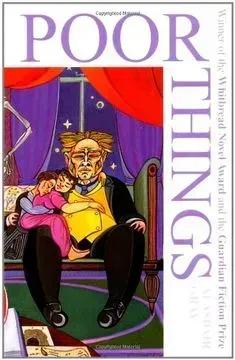With the premiere of the movie Poor Things (Pobres Criaturas, 2023), directed by Yorgos Lanthimos and starring Emma Stone, Mark Ruffalo, Rammi Yussuf, and Willem Dafoe, interest in the homonymous novel by Scottish writer Alasdair Gray grew exponentially. With a bold and disruptive style, the author manages to describe and ridicule Victorian society through satire and humor.
Bella Baxter is a young Scottish woman with a northern English accent who behaves, literally, like a child. When Archibald Mccandless, a young Scottish doctor, arrives at the house of Godwin Baxter, a strange doctor he met at university, he encounters Bella Baxter and falls head over heels in love with this eccentric young woman. It is through this character that we will learn the story of who was, for him, the great love of his life.
In the following pages, Baxter tells Mccandless about Bella's history. It turns out that her mother, Victoria Blessington, decided to take her life by jumping from a bridge. Baxter discovered the body of young Victoria who was at an advanced stage of pregnancy.
Instead of saving the mother, Goodwill Baxter chooses to respect the young woman's will to leave this world and places the baby’s brain in Victoria's body. Thus, the woman's body will live on through her daughter's soul.
At first glance, the premise of this novel resembles the plot of Frankenstein or the Modern Prometheus, written by Mary Shelley and published in 1818. However, alongside the ethical and moral dilemma regarding scientific and technological advancements—after all, the name of the inventor character, Goodwill Baxter, refers to the divine power of creating and taking life—are the conflicts and tensions inherent in a United Kingdom marked by British colonization and imperialism.
The journey that Bella Baxter undertakes with her suitor Duncan Wederburn through several metropolises—Alexandria, Paris, Odessa—helps her understand the suffering of indigenous peoples at the hands of the Anglo-Saxons, apparently superior beings according to various interlocutors Bella Baxter meets during her travels.
The Scottish origin of Godwin Baxter and Mccandless is relevant to the work of an author who always seeks to emphasize the yoke endured by the Scots from the United Kingdom.
This counterpoint between Scotland and England is observed towards the end of the novel when General Blessington, the husband of young Victoria, mother of Bella Baxter, makes an appearance to reclaim his wife.
Through a series of arguments, Bella returns to Glasgow with God and Mccandless in a final outcome that seals the victory of the young Scottish doctor over the acclaimed British colonial officer.
But in the epilogue of this novel, we find a letter written by Victoria Mccandless explaining her true story. Instead of being rescued by Baxter, she sealed her fate by voluntarily presenting herself in Scotland. Regardless of which version we choose to believe (Mccandless’s or Bella/Victoria’s), the truth is that the young woman becomes a nurse and later a doctor, defying all conventions of the Victorian era.
In short, this beautiful novel immerses us in the surreal world of Victorian Scotland, with its social and political conflicts with the Empire.


Comments